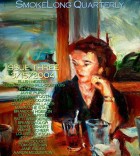You love her tears. They don’t come often, not nearly as often as anger, that almost inspirational rage, fury—absolute and instant.
When you look at her, you see a pretty woman just past the childbearing years, usually covered in garden dirt, and you know the history. Maybe others can see it around her mouth, which sometimes droops when she’s working.
Around the house she smells like bacon and gasoline, like the rest of Arkansas, though you can clean her up. It might take a scrub brush and currycomb, you think, then she steps from the bath scented with gardenias. Her long legs are smooth, the bones delicate and fine. You can dress her in black silk, buy her a new coat with a white fox collar. She becomes a beautiful woman at ease with herself. She can dance, she can mingle, she can charm strangers with butterfly movements of those tiny hands.
She’s no reader, this woman. A rider of horses, once a florist, now she burns wood plaques and paints. She tends to her garden. She waves, as all country people do, to passing strangers as their cars stumble along dirt roads. She stands beside the open driver’s window giving directions that involve old trees and red fences. “Y’all go past the pig smell and turn right at the burned out chicken ranch.” And she waves, muttering, “They’ll never find it.”
“Because you said right when you meant left.”
“Oh my gosh.” And she wants you to overtake them in the truck, these people that she’ll never see again. It must be you, for she doesn’t drive. She can pit her hundred pounds against a full-grown stallion, but she won’t face the mountain roads.
There are many things she cannot face: water, snakes, your aging face. She lies and says your hair is silver though there is less of it each year.
In public, at a formal dance, perhaps with her hair piled up, there are certain subjects you should avoid. Abortion. Right and wrong.
She says, “Oh shush,” when you dance, with lips against her neck and you simply must tell her she’s the most beautiful woman in the room. An incurable flirt, she already knows it’s true, even at university dances, where your students stare.
The girls are less than half her age and sometimes she wears the size two leather pants and whispers, “That one loves you… the bitch.” And she breaks the hearts of would-be ballerinas, the way her body moves.
Sometimes she stays up all night smoking cigarettes, her eyes focused on nothing you can see. You come bumbling barefoot in the shiny black robe she bought and want to say, “We should have adopted.” But you don’t.
Instead, you read aloud the best of that semester’s papers.
Sometimes she’ll turn her head away. A purse snaps open. Makeup and a mirror come out. What is that glistening in the corner of her eye?
A tear, just one.
One watery jewel upon her face represents so many miscarriages and a life not quite complete. Oh yes, a husband who loves her. Always that… but not quite everything.
You look back over the history of your life. There are things you can’t change, wouldn’t change, because without her you would be invisible, colorless—without vigor or personality. Your slate would be blank. And you wonder if tears are something you should feel, or are those emotions reserved for her?


 The core workshop of SmokeLong Fitness is all in writing, so you can take part from anywhere at anytime. We are excited about creating a supportive, consistent and structured environment for flash writers to work on their craft in a community. We are thrilled and proud to say that our workshop participants have won, placed, or been listed in every major flash competition. Community works.
The core workshop of SmokeLong Fitness is all in writing, so you can take part from anywhere at anytime. We are excited about creating a supportive, consistent and structured environment for flash writers to work on their craft in a community. We are thrilled and proud to say that our workshop participants have won, placed, or been listed in every major flash competition. Community works.